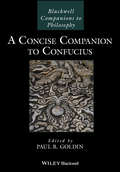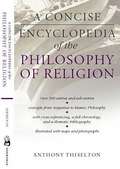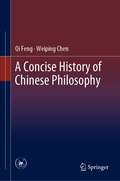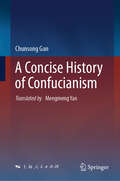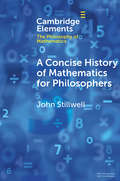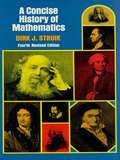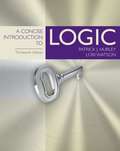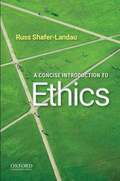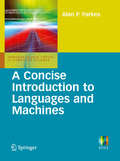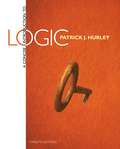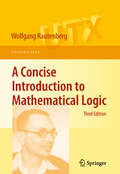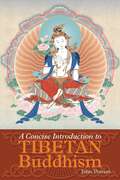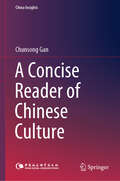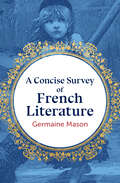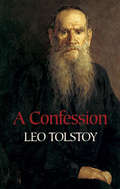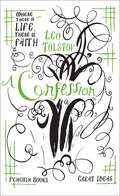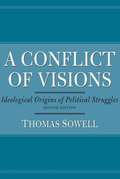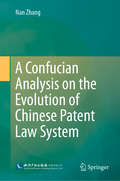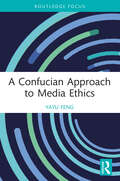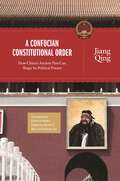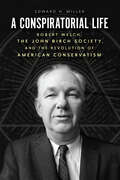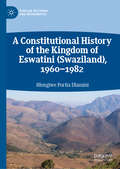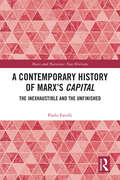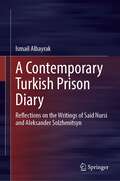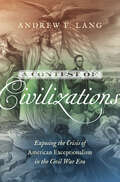- Table View
- List View
A Concise Companion to Confucius
by Paul R. GoldinThis authoritative collection surveys the teachings of Confucius, and illustrates his importance throughout Chinese history in one focused and incisive volume. A Concise Companion to Confucius offers a succinct introduction to one of East Asia’s most widely-revered historical figures, providing essential coverage of his legacy at a manageable length. The volume embraces Confucius as philosopher, teacher, politician, and sage, and curates a collection of key perspectives on his life and teachings from a team of distinguished scholars in philosophy, history, religious studies, and the history of art. Taken together, chapters encourage specialists to read across disciplinary boundaries, provide nuanced paths of introduction for students, and engage interested readers who want to expand their understanding of the great Chinese master. Divided into four distinct sections, the Concise Companion depicts a coherent figure of Confucius by examining his diverse representations from antiquity through to the modern world. Readers are guided through the intellectual and cultural influences that helped shape the development of Confucian philosophy and its reception among late imperial literati in medieval China. Later essays consider Confucius’s engagement with topics such as warfare, women, and Western philosophy, which remain fruitful avenues of philosophical inquiry today. The collection concludes by exploring the significance of Confucian thought in East Asia’s contemporary landscape and the major intellectual movements which are reviving and rethinking his work for the twenty-first century. An indispensable resource, A Concise Companion to Confucius blazes an authoritative trail through centuries of scholarship to offer exceptional insight into one of history’s earliest and most influential ancient philosophers. A Concise Companion to Confucius: Provides readers with a broad range of perspectives on the ancient philosopher Traces the significance of Confucius throughout Chinese history—past, present, and future Offers a unique, interdisciplinary overview of Confucianism Curated by a team of distinguished scholars in philosophy, history, religious studies, and the history of art A Concise Companion to Confucius is an ideal text for undergraduate and graduate courses on Confucius and Confucianism. It is also fascinating and informative reading for anyone interested in learning more about one of history’s most influential philosophers.
A Concise Encyclopedia of the Philosophy of Religion (Concise Encyclopedias)
by Anthony C. ThiseltonCovering thinkers from Plato to Freud, offering detailed explanations of key themes such as evil, and outlining clear definitions of complex ideas like'the doctrine of analogy,' this is a comprehensive reference tool for all those studying, or interested in, the philosophy of religion
A Concise History of Chinese Philosophy
by Qi Feng Weiping ChenThis book is an abridged version of Feng Qi’s two major works on the history of philosophy, The Logical Development of Ancient Chinese Philosophy and The Revolutionary Course of Modern Chinese Philosophy. It is a comprehensive history of Chinese philosophy taking the reader from ancient times to the year 1949. It illuminates the characteristics of traditional Chinese philosophy from the broader vantage point of epistemology. The book revolves around important debates including those on “Heaven and humankind” (tian ren天人), “names and actualities” (mingshi名實), “principle and vital force” (liqi理氣), “the Way and visible things” (daoqi道器), “mind and matter/things” (xinwu心物), and “knowledge and action” (zhixing知行). Through discussion of these debates, the course of Chinese philosophy unfolds. Modern Chinese philosophy has made landmark achievements in the development of historical and epistemological theory, namely the “dynamic and revolutionary theory of reflection”. However, modern Chinese philosophy is yet to construct a systematic overview of logic and methodology, as well as questions of human freedom and ideals. Amid this discussion, the question of how contemporary China is to “take the baton” from the thinkers of the modern philosophical revolution is addressed.
A Concise History of Confucianism
by Chunsong GanThis book is a readable and insightful analytical work that steadily traces and analyzes the historical development of Confucianism in China. This book is structured chronologically and discusses the developing positions of Confucianism across different periods in the Chinese history. Each chapter focuses on a number of key questions and perspectives pertaining to Confucian thoughts and ideas, for example, &‘Benevolence&’ and &‘Propriety&’ in Pre-Qin Confucianism, studies of Mencius and Xunzi, and Dong Zhongshu of the Han Dynasty . In addition, this book pays special and extensive attention to ideas of New Confucianism, its concepts, and formation. This book is written in a simple yet comprehensible style. It aims to broaden and deepen studies of Confucianism via its stage-by-stage discussion about the historical development of Confucian thoughts. Both academic specialists and ordinary readers will find the book helpful and inspiring in its clear and vivid delineation, analysis, and debate about the essence, function, and role of Confucianism in traditional and modern societies alike.
A Concise History of Mathematics for Philosophers (Elements in the Philosophy of Mathematics)
by John StillwellThis Element aims to present an outline of mathematics and its history, with particular emphasis on events that shook up its philosophy. It ranges from the discovery of irrational numbers in ancient Greece to the nineteenth- and twentieth-century discoveries on the nature of infinity and proof. Recurring themes are intuition and logic, meaning and existence, and the discrete and the continuous. These themes have evolved under the influence of new mathematical discoveries and the story of their evolution is, to a large extent, the story of philosophy of mathematics.
A Concise History of Mathematics: Fourth Revised Edition (Dover Books on Mathematics)
by Dirk J. StruikThis compact, well-written history -- first published in 1948, and now in its fourth revised edition -- describes the main trends in the development of all fields of mathematics from the first available records to the middle of the 20th century. Students, researchers, historians, specialists -- in short, everyone with an interest in mathematics -- will find it engrossing and stimulating.Beginning with the ancient Near East, the author traces the ideas and techniques developed in Egypt, Babylonia, China, and Arabia, looking into such manuscripts as the Egyptian Papyrus Rhind, the Ten Classics of China, and the Siddhantas of India. He considers Greek and Roman developments from their beginnings in Ionian rationalism to the fall of Constantinople; covers medieval European ideas and Renaissance trends; analyzes 17th- and 18th-century contributions; and offers an illuminating exposition of 19th century concepts. Every important figure in mathematical history is dealt with -- Euclid, Archimedes, Diophantus, Omar Khayyam, Boethius, Fermat, Pascal, Newton, Leibniz, Fourier, Gauss, Riemann, Cantor, and many others. For this latest edition, Dr. Struik has both revised and updated the existing text, and also added a new chapter on the mathematics of the first half of the 20th century. Concise coverage is given to set theory, the influence of relativity and quantum theory, tensor calculus, the Lebesgue integral, the calculus of variations, and other important ideas and concepts. The book concludes with the beginnings of the computer era and the seminal work of von Neumann, Turing, Wiener, and others."The author's ability as a first-class historian as well as an able mathematician has enabled him to produce a work which is unquestionably one of the best." -- Nature Magazine.
A Concise Introduction To Logic
by Patrick J. Hurley Lori WatsonTens of thousands of students have learned to be more discerning at constructing and evaluating arguments with the help of Patrick J. Hurley. Hurley’s lucid, friendly, yet thorough presentation has made A CONCISE INTRODUCTION TO LOGIC the most widely used logic text in North America. In addition, the book’s accompanying technological resources, such as CengageNOW and Learning Logic, include interactive exercises as well as video and audio clips to reinforce what you read in the book and hear in class. In short, you’ll have all the assistance you need to become a more logical thinker and communicator.
A Concise Introduction to Ethics
by Russ Shafer-LandauThis book offers a condensed and exceptionally well-written introduction to the essential moral theories. Based on Russ Shafer-Landau's best-selling primer on ethical theory, The Fundamentals of Ethics, this briefer volume retains the longer one's content advantage over competing books by addressing issues that other texts omit, including the good life (value theory), natural law, and prima facie duties. <p><p>It also incorporates discussion questions and case studies at the end of each chapter, giving students the opportunity to apply ethical theories to real-world moral problems. A perfect companion to Shafer-Landau's anthology, The Ethical Life, this volume's compact size and low price make this book an ideal complement to any course where it is important that students understand moral theories.
A Concise Introduction to Languages and Machines (Undergraduate Topics in Computer Science)
by Alan P. ParkesA Concise Introduction to Languages, Machines and Logic provides an accessible introduction to three key topics within computer science: formal languages, abstract machines and formal logic. Written in an easy-to-read, informal style, this textbook assumes only a basic knowledge of programming on the part of the reader. The approach is deliberately non-mathematical, and features: - Clear explanations of formal notation and jargon, - Extensive use of examples to illustrate algorithms and proofs, - Pictorial representations of key concepts, - Chapter opening overviews providing an introduction and guidance to each topic, - End-of-chapter exercises and solutions, - Offers an intuitive approach to the topics. This reader-friendly textbook has been written with undergraduates in mind and will be suitable for use on course covering formal languages, formal logic, computability and automata theory. It will also make an excellent supplementary text for courses on algorithm complexity and compilers.
A Concise Introduction to Logic (Twelfth Edition)
by Patrick J. HurleyUnsurpassed for its clarity and comprehensiveness, Hurley's A CONCISE INTRODUCTION TO LOGIC is the #1 introductory logic book on the market. In this Twelfth Edition, Hurley continues to build upon the tradition of a lucid, focused, and accessible presentation of the basic subject matter of logic, both formal and informal. The edition's new Previews connect a section's content to real-life scenarios, using everyday examples to "translate" new notions and terms into concepts that readers unfamiliar with the subject matter can relate to. An extensive, carefully sequenced collection of exercises guides readers toward greater proficiency with the skills they are learning.
A Concise Introduction to Mathematical Logic (Universitext)
by Wolfgang RautenbergTraditional logic as a part of philosophy is one of the oldest scientific disciplines and can be traced back to the Stoics and to Aristotle. Mathematical logic, however, is a relatively young discipline and arose from the endeavors of Peano, Frege, and others to create a logistic foundation for mathematics. It steadily developed during the twentieth century into a broad discipline with several sub-areas and numerous applications in mathematics, informatics, linguistics and philosophy. This book treats the most important material in a concise and streamlined fashion. The third edition is a thorough and expanded revision of the former. Although the book is intended for use as a graduate text, the first three chapters can easily be read by undergraduates interested in mathematical logic. These initial chapters cover the material for an introductory course on mathematical logic, combined with applications of formalization techniques to set theory. Chapter 3 is partly of descriptive nature, providing a view towards algorithmic decision problems, automated theorem proving, non-standard models including non-standard analysis, and related topics. The remaining chapters contain basic material on logic programming for logicians and computer scientists, model theory, recursion theory, Gödel's Incompleteness Theorems, and applications of mathematical logic. Philosophical and foundational problems of mathematics are discussed throughout the text. Each section of the seven chapters ends with exercises some of which of importance for the text itself. There are hints to most of the exercises in a separate file Solution Hints to the Exercises which is not part of the book but is available from the author's website.
A Concise Introduction to Tibetan Buddhism
by John PowersLucid and economical, this introductory text delivers a brisk, fast-moving survey of Tibetan Buddhism. For many years Powers's nearly 600-page Introduction to Tibetan Buddhism has served as the field's most authoritative and comprehensive overview of Tibet's distinctive Buddhist tradition. A Concise Introduction to Tibetan Buddhism explains the core Buddhist doctrines and the practices of meditation and tantra and provides a survey of the four main schools of Tibetan Buddhism.
A Concise Reader of Chinese Culture (China Insights)
by Chunsong GanThis book uses the mutual interactions between Chinese and Western culture as a point of departure in order to concisely introduce the origins and evolution of Chinese culture at the aspects of constitution, thinking, values and atheistic. This book also analyzes utensil culture, constitution culture and ideology culture, which were perfected by absorbing classic arguments from academia. As such, the book offers an essential guide to understanding the development, civilization and key ideologies in Chinese history, and will thus help to promote Chinese culture and increase cultural awareness.
A Concise Survey of French Literature
by Germaine MasonAn overview of French literature as it evolved from the Middle Ages to the mid-twentieth century. In this compact yet wide-ranging volume, the many aspects of French literature and the different tendencies of successive schools are shown in the light of contemporaneous political and artistic developments. A Concise Survey of French Literature explores the relationship between literature and the evolution of French thought, deeply concerned, as it is, with the problems of human life and destiny. It also serves as an excellent reference for any student of French literature.
A Confession (Hesperus Classics Ser.)
by Leo Tolstoy Aylmer MaudeDespite having written War and Peace and Anna Karenina, Leo Tolstoy, at the age of 51, looked back on his life and considered it a meaningless, regrettable failure. A Confession provides insight into the great Russian writer's movement from the pursuit of aesthetic ideals toward matters of religious and philosophical consequence.Authentic and genuinely moving, this memoir of midlife spiritual crisis was first distributed in 1872 and marked a turning point in the author's career as a writer: in subsequent years, Tolstoy would write almost exclusively about religious life, especially devotion among the peasantry.Generations of readers have been inspired by this heartfelt reexamination of Christian orthodoxy and subsequent spiritual awakening. Ranked among the best books on the subject, this timeless work is for anyone who has ever worried about the fleeting nature of life and speculated about the value of existence.
A Confession (Penguin Great Ideas)
by Leo TolstoyDescribing Tolstoy's crisis of depression and estrangement from the world, A Confession is an autobiographical work of exceptional emotional honesty. It describes his search for 'a practical religion not promising future bliss but giving bliss on earth'. Although the Confession led to his excommunication, it also resulted in a large following of Tolstoyan Christians springing up throughout Russia and Europe. Throughout history, some books have changed the world. They have transformed the way we see ourselves – and each other. They have inspired debate, dissent, war and revolution. They have enlightened, outraged, provoked and comforted. They have enriched lives – and destroyed them. Now Penguin brings you the works of the great thinkers, pioneers, radicals and visionaries whose ideas shook civilization and helped make us who we are.
A Conflict of Visions: Ideological Origins of Political Struggles
by Thomas SowellIn this classic work, Thomas Sowell analyzes the two competing visions that shape our debates about the nature of reason, justice, equality, and power. The "constrained" vision, which sees human nature as unchanging and selfish, and the "unconstrained" vision, in which human nature is malleable and perfectible. He describes how these two radically opposed views have manifested themselves in the political controversies of the past two centuries, including such contemporary issues as welfare reform, social justice, and crime. Updated to include sweeping political changes since its first publication in 1987, this revised edition of A Conflict of Visions offers a convincing case that ethical and policy disputes circle around the disparity between both outlooks.
A Confucian Analysis on the Evolution of Chinese Patent Law System
by Nan ZhangThis book comprehensively discusses the main features of the Chinese patent law system, which not only legally ‘transplants’ international treaties into the Chinese context, but also maintains China’s legal culture and promotes domestic economic growth. This is the basis for encouraging creativity and improving patent law protection in China. The book approaches the evolution of the Chinese patent system through the ancient Chinese philosopher Confucius’s classic principle, offering readers a fresh new way to understand and analyze Chinese patent law reforms, while also outlining how Confucian insights could be used to improve the enforcement of patent law and overall intellectual property protection awareness in China. It examines ancient Chinese innovation history, explores intellectual property from a Confucian perspective, and discusses the roots of Chinese patent law, as well as the past three amendments and the trends in the ongoing fourth amendment. In addition to helping readers grasp the mentality behind the Chinese approach to patent law and patent protection, the book provides an alternative research methodology and philosophical approach by demonstrating Confucian analysis, which provides a more dynamic way to justify intellectual property in the academic world. Lastly, it suggests future strategies for local industries in the legal, cultural and sociological sectors in China, which provide benefits for domestic and overseas patent holders alike. The book offers a valuable asset for graduate students and researchers on China and intellectual property law, as well as general readers interested in Asian culture and the philosophy of law.
A Confucian Approach to Media Ethics (Routledge Focus on Communication Studies)
by Yayu FengA Confucian Approach to Media Ethics offers a comprehensive theorization of an approach to media ethics based on the moral philosophy that originated from China and that profoundly influenced East Asian countries.This book engages with foundational concepts from Confucian ethics and explicates a new framework that can be used for guiding media practices, as well as media ethics research and teaching. It suggests that the Confucian ideals of He (harmony), Zhong (equilibrium), and the notion of Junzi can be applied to guide intercultural media practices, and sets out a fresh model for ethics education centered on Xiuji (self-cultivation) that is different from the training-based and decision-making-centered model prevalent in the Western classrooms. This is also a framework that emphasizes both individual moral growth and the moral character of the broader professional community.Filling a gap in the conversation between Eastern and Western approaches to media ethics, this innovative and important volume will offer new perspectives to students and scholars of media ethics, communication studies, and comparative philosophy.
A Confucian Constitutional Order: How China's Ancient Past Can Shape Its Political Future (The Princeton-China Series #4)
by Jiang QingWhat a Confucian constitutional government might look like in China's political futureAs China continues to transform itself, many assume that the nation will eventually move beyond communism and adopt a Western-style democracy. But could China develop a unique form of government based on its own distinct traditions? Jiang Qing—China's most original, provocative, and controversial Confucian political thinker—says yes. In this book, he sets out a vision for a Confucian constitutional order that offers a compelling alternative to both the status quo in China and to a Western-style liberal democracy. A Confucian Constitutional Order is the most detailed and systematic work on Confucian constitutionalism to date.Jiang argues against the democratic view that the consent of the people is the main source of political legitimacy. Instead, he presents a comprehensive way to achieve humane authority based on three sources of political legitimacy, and he derives and defends a proposal for a tricameral legislature that would best represent the Confucian political ideal. He also puts forward proposals for an institution that would curb the power of parliamentarians and for a symbolic monarch who would embody the historical and transgenerational identity of the state. In the latter section of the book, four leading liberal and socialist Chinese critics—Joseph Chan, Chenyang Li, Wang Shaoguang, and Bai Tongdong—critically evaluate Jiang's theories and Jiang gives detailed responses to their views.A Confucian Constitutional Order provides a new standard for evaluating political progress in China and enriches the dialogue of possibilities available to this rapidly evolving nation. This book will fascinate students and scholars of Chinese politics, and is essential reading for anyone concerned about China's political future.
A Conspiratorial Life: Robert Welch, the John Birch Society, and the Revolution of American Conservatism
by Edward H. Miller“A cleverly written, finely textured, and badly needed study of a pivotal and too-often marginalized figure in the development of the modern American Right.” —The Journal of Southern History Though you may not know his name, Robert Welch (1899-1985)—founder of the John Birch Society—is easily one of the most significant architects of our current political moment. In A Conspiratorial Life, the first full-scale biography of Welch, Edward H. Miller delves deep into the life of an overlooked figure whose ideas nevertheless reshaped the American right.A child prodigy who entered college at age twelve, Welch became an unlikely candy magnate, founding the company that created Sugar Daddies, Junior Mints, and other famed confections. In 1958, he funneled his wealth into establishing the organization that would define his legacy and change the face of American politics: the John Birch Society. Though the group’s paranoiac right-wing nativism was dismissed by conservative thinkers like William F. Buckley, its ideas gradually moved from the far-right fringe into the mainstream. By exploring the development of Welch’s political worldview, A Conspiratorial Life shows how the John Birch Society’s rabid libertarianism—and its highly effective grassroots networking—became a profound, yet often ignored or derided influence on the modern Republican Party. Miller convincingly connects the accusatory conservatism of the midcentury John Birch Society to the inflammatory rhetoric of the Tea Party, the Trump administration, Q, and more. As this book makes clear, whether or not you know his name or what he accomplished, it’s hard to deny that we’re living in Robert Welch’s America.“Offers a good angle from which to appraise the fractured state of American conservatism.” —Financial Times
A Constitutional History of the Kingdom of Eswatini (African Histories and Modernities)
by Hlengiwe Portia DlaminiSwaziland—recently renamed Eswatini—is the only nation-state in Africa with a functioning indigenous political system. Elsewhere on the continent, most departing colonial administrators were succeeded by Western-educated elites. In Swaziland, traditional Swazi leaders managed to establish an absolute monarchy instead, qualified by the author as benevolent and people-centred, a system which they have successfully defended from competing political forces since the 1970s. This book is the first to study the constitutional history of this monarchy. It examines its origins in the colonial era, the financial support it received from white settlers and apartheid South Africa, and the challenges it faced from political parties and the judiciary, before King Sobhuza II finally consolidated power in 1978 with an auto-coup d’état. As Hlengiwe Dlamini shows, the history of constitution-making in Swaziland is rich, complex, and full of overlooked insight for historians of Africa.
A Contemporary History of Marx’s Capital: The Inexhaustible and the Unfinished (Marx and Marxisms)
by Paolo FavilliPaolo Favilli provides both students and scholars with an original reading of themes and issues found in Karl Marx’s Das Kapital and its connections with present- day challenges. By way of continuous cross- referencing between present and past, Favilli demonstrates that claims regarding the scientific status of Das Kapital, advanced by countless texts since its original publication, are themselves deeply imbued by the ‘spirit of the times’. If in 1963 Jean-Paul Sartre could write that Marxism was the unsurpassable philosophical horizon of our times, what could make an undergraduate student today consider such a claim plausible?Informed by the latest research on Marxist theory and decades of teaching the Philosophy of History, Favilli employs a didactic approach stimulating student engagement and learning opportunities in the classroom. This approach allows for a better understanding of relationship between the present and the multiple temporalities that characterise and periodise the contemporary era. What follows is a critique of the contemporary academy for its hangover of post-1989 nuovismo (cult of novelty) and inability to make the proper distinctions between Marxism-as-party-state, the works of Karl Marx, and Marxism as an object of history. This led to the spectacle where after 1989, those who had spent most of their careers as Marxist-hued scholars not only abandoned this identity but also spurned any recognition that Marx and Marxism were worthwhile objects of enquiry.This book was first published in Italian as A proposito de ‘Il capitale’..., Il lungo presente e i miei studenti. Corso di storia contemporanea (Milan: FrancoAngeli, 2021). This English translation includes a new foreword by the author.
A Contemporary Turkish Prison Diary: Reflections on the Writings of Said Nursi and Aleksander Solzhenitsyn
by Ismail AlbayrakThis book explores the religious experiences of two notable figures who endured severe trials under authoritarian regimes: Bediuzzaman Said Nursi (1877–1960) within the Islamic tradition, and Aleksander Solzhenitsyn (1918–2008) within the Russian Orthodox Christian tradition. Against the tumultuous backdrop of the twentieth century’s spiritual, social, political, and intellectual upheavals, both Nursi and Solzhenitsyn grappled with immense hardships because of their beliefs. Despite immense tribulations, both individuals demonstrated unwavering faith and resilience in the face of adversity, continuing their scholarly and literary activities. The current study centers on the dichotomy of spiritual confinement and expansiveness, illustrating how people can experience spiritual distress even without physical restraints. It explores the historical and conceptual aspects of imprisonment within Christian and Muslim perspectives, explores the reasons for Nursi and Solzhenitsyn's incarceration, examines their coping mechanisms in the face of hardship, and underscores the role of faith and spirituality. The author integrates personal experiences, particularly his own incarceration during the aftermath of the 2016 Turkish staged coup attempt, within the context of the narratives of Nursi and Solzhenitsyn. The book addresses court proceedings, release, departure from Turkey, and resettlement in Australia. Throughout, the author draws parallels between their own observations and those of Nursi and Solzhenitsyn, contributing to the broader discourse on individual spirituality and collective consciousness. The book offers insights into spiritual resilience in the face of adversity, utilizing the lives of these figures to illuminate shared human experiences. A unique collation of personal narration and scholarly reflection, it is relevant to academics and students in history, political science, sociology, Islamic and Middle Eastern studies, and to social scientists researchingthe phenomenon of exile and prison in different countries across the world. It also speaks to the work of activists and policymakers in human rights.
A Contest of Civilizations: Exposing the Crisis of American Exceptionalism in the Civil War Era (Littlefield History of the Civil War Era)
by Andrew F. LangMost mid-nineteenth-century Americans regarded the United States as an exceptional democratic republic that stood apart from a world seemingly riddled with revolutionary turmoil and aristocratic consolidation. Viewing themselves as distinct from and even superior to other societies, Americans considered their nation an unprecedented experiment in political moderation and constitutional democracy. But as abolitionism in England, economic unrest in Europe, and upheaval in the Caribbean and Latin America began to influence domestic affairs, the foundational ideas of national identity also faced new questions. And with the outbreak of civil war, as two rival governments each claimed the mantle of civilized democracy, the United States' claim to unique standing in the community of nations dissolved into crisis. Could the Union chart a distinct course in human affairs when slaveholders, abolitionists, free people of color, and enslaved African Americans all possessed irreconcilable definitions of nationhood? In this sweeping history of political ideas, Andrew F. Lang reappraises the Civil War era as a crisis of American exceptionalism. Through this lens, Lang shows how the intellectual, political, and social ramifications of the war and its meaning rippled through the decades that followed, not only for the nation's own people but also in the ways the nation sought to redefine its place on the world stage.
